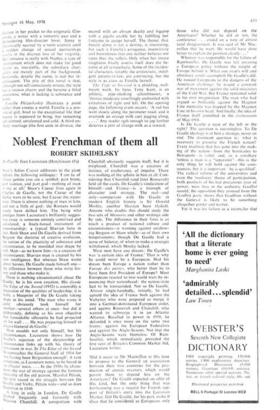NEW NOVELS
Saddest story
Maurice CAPITANCHIK
Down All the Days Christy Brown (Secker and Warburg 30s) Joseph Mervyn Jones (Cape 42s) A Winter in the Hills John Wain (Macmillan 38s) The Bay of Noon Shirley Hazzard (Mac- millan 30s) Fenella Phizackerley Margaret Forster (Seeker and Warburg 35s) The Type to Succeed John Vaizey (VVeiden, feld and Nicolson 30s)
Christy Brown's novel is a lyrical, fictional- ised account of a life almost too painful for the rest of us to contemplate. One of a poor Dublin family of twenty-two children, of which thirteen have survived, he suffers from a variety of cerebral palsy which allows him the full use of only his left foot. The difficulty in understanding spastics is, apparently, to know whether the sufferer is an intelligent being or a human vegetable. As Christy Brown wrote an autobiography at the age of twenty-one, despite never hav- ing been to school, there has been no doubt for many years that he is the former. Now, at thirty-seven, he has produced a book which, although over-written and over- worked, has rich descriptive quality, vivid fantasy, is devoid of self-pity, and, for reasons only partly to do with Mr Brown's physical condition, must be one of the sad- dest books ever written.
This is a story with a double theme: the tragic waste of life through brutalising ignorance as well as spasticity. Taken by his tough brothers to see a nude peep-show, the crippled hero hates them for arousing his sense of shame, reminding him of the time he saw his sister's naked body: his whole body suddenly flaming and a loud roaring in his temples, he saw her pale breasts appear over the dark satin cupolas . . the lace pattern of the curtains swaying on her flesh, the nipples dark as berries in the snow; it was beauty and perfection and terror . .
These 'feelings merely harm his relation- ships. A girl deliberately provokes him sexually to see if he reacts 'like the rest'; while she does so, her young brother drowns. The violent, drunken father, taking out every frustration on his exhausted wife and frightened children, causes the elder boys to join the army and the eldest girl to run away. The most amazing aspect of this work is the way the crippled youth, seeing and understanding more than the others, although never able to use his aggression-laden sexuality, realises the tragic implications of instinct and has compassion for what it does to 'normal' people. In a slightly maudlin but impressive chapter, the father, near to death, realises the futility of his life, for which he blames no one: 'he saw finally his own utter weakness.' The author never condemns help- lessness, his indignation is reserved for its abusers: the doctor who doesn't explain why he fondles the cripple's genitals, the nurses who laugh at his erection. If there is a villain, it is, by implication, the Catholic church, which turns men towards destruction by con- demning their desires.
This novel has a curious affinity with the work of the American author,- Thomas Wolfe. There is a similar prediliction for the rhetoric of frenzy, words such as 'glittering', `teeming', 'marvelling', and a similar ability to portray characters alive in every physical
detail, especially the obscene-tongued widow Red Magso, with her 'coarse moist mouth opening wide on a tremendous trumpet-wail of infuriated protest', but both are more controlled and less erudite than in Wolfe. Physically, Wolfe was the opposite to Christy Brown; huge, athletic and a wanderer, yet the source of his intensity, a narrow, claus- trophobic upbringing, bound him emotion- ally perhaps even more. The implication of this, like the implication of Mr Brown's writing, is that the true cripple is the psycho, logical cripple—freedom is of the mind.
This is not a great novel, it is too close to the root of experience, and the echoes of Joyce and O'Casey ring too loud. But by writing it, Christy Brown shows himself to be a great man. Never again will we be able complacently to assume a deformed child to be a deficient human being.
Mervyn Jones's Joseph is based on the life of Stalin, who could not have been invented
by a novelist; he was the manifestation of a recurrent nightmare to which the Russian people are subject, of which Ivan the Terrible and Genghiz Khan were earlier versions.
Such a being, wooden and stilted in life, easily turns to cardboard in fiction, and Mr Jones has not avoided the trap. He shows the later part of Stalin's life mainly through his effects on others and, though he does not achieve an original vision, he does make clear
by means of appropriate selection and inven- tion of incident that the dictator needed to
kill to prove his god-like power. Using his tank-engine of a mind to propel his organis- ing ability, Stalin grinds his way through the revolutionary movement, from poor sem- inarist to omnipotent ruler of an oppressed people.
All the names have been transposed into English, thus Trotsky becomes 'Leonard' and Stalin, 'Smith' (!), which all but destroys their credibility, but a more serious weakness is the unconscious humour, partly the result of inadequacy of style. Sergo Ordjonikdze, called 'Sam', the heavy industry boss, furious at the arrest of his subordinate, threatens Stalin: 'I'm going to put this right, Joe, if it's the last thing I do before I die.' Of course, it is. The language, of the just man to the gangster, is curiously and grotesquely apt.
To go from nightmare to fairy-tale, John Wain's A Winter in the Hills concerns phil-
ologist Roger Furnivall, gone to Wales to learn the language, who joins the struggle of hunchback bus-owner Gareth Jones against the local Mafia. Roger's more basic aim is to find a woman, end he pursues both ventures. Oozing with sentiment about Christmas, cripples and minority cultures, the intentions are honourable but the style is hackneyed, and one word is never used where two will do. The countryside after a fall of snow is `so new, so unfamiliar, so magical'; shop windows at evening are 'rectangles of yellow light', and the local glamour girl wears `delicious little woollen muffs'. The characters are unconvincingly split between the 'good' and the 'bad' and, because of Roger's basic sexual coarseness, the love scenes are em- barrassing, and coy. The Welsh poet Madog, a sort of shrewder Dylan Thomas who is faithful to the Celtic tongue, is credible but, although Mr Wain has great facility, on the whole his novel is glutinous, verbose and fey, and his philologist hero should know that Scotch refers to whisky and not to people.
Shirley Hazzard's The Bay of Noon is of another order of fondness, an evocation of a youthful experience of Naples. Jenny Uns- worth takes a job with NATO, with an intro, duction in her pocket to the enigmatic Gio- ,:anda, a writer with a romantic past and a philandering film-director lover. Jenny is platonically squired by a NATO scientist until a sudden change of sexual partnerships results in the discreet loss of her virginity. Her romance is really with Naples, a type of involvement which does not make for good fiction as, inevitably, the subsidiary char- acters are merely part of the background. Gioconda, despite the name, is real but in- consequent. The pity of this novel is that, although too self-consciously ornate, the style has a rococo charm and the heroine a fitful awareness; what is lacking is substance and point.
Fenella Phizackerley illustrates a point rather than creates a world. Fenella is a pro- vincial girl, bred to the exceptional life that beauty is supposed to bring, but remaining self-centred, untalented and cold. A third un- likely marriage (the first ends in divorce, the
second with an abrupt death) and bigamy with a gigolo enable her by fulfilling her fantasies to accept herself. The theme, that beauty alone is not a destiny, is interesting, but such is Fenella's arrogance, insensitivity and boorishness that one neither believes nor cares that she suffers. Only when her innate toughness finally asserts itself does she be- come at all sympathetic. Some of the inciden- tal characters, notably the aristocratic, indul- gent parents-in-law, are convincing, but the style is as crass as Fenella herself.
The Type to Succeed is a plodding, well- meant work. Its hero, Tony Kent, is an athletic, pipe-smoking schoolmaster, a 'thirties moderate unwillingly embroiled with extremists of right and left. On the opening page, the following event occurs: 'A red bus went slowly along the perimeter road; and it overtook an orange milk cart jogging along, ....' Any reader rash enough to jog further deserves a pint of orange milk as a reward.



































 Previous page
Previous page